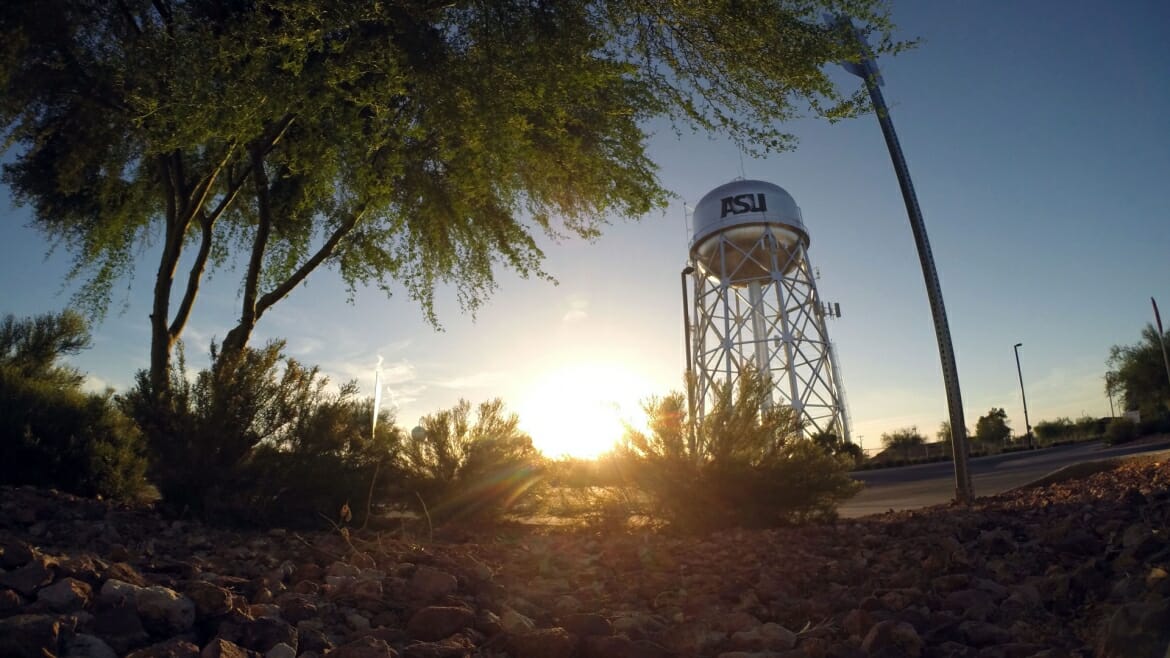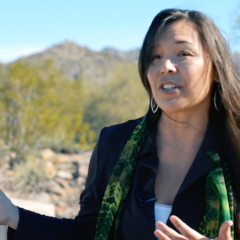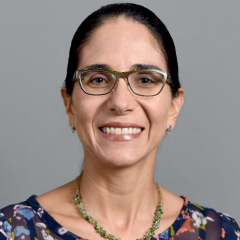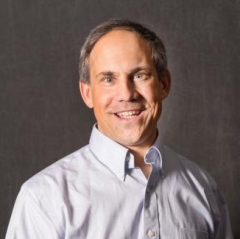Faculty honorees at the forefront of innovation, inclusion and entrepreneurial spirit
Each year, Arizona State University names faculty from across the university as President’s Professors. This prestigious designation has honored dozens of faculty members since 2006 and continues to do so for faculty who showcase enthusiasm and innovation in teaching, the ability to inspire original and creative work by students, mastery of subject matter and scholarly contributions.
The 2022 honorees include two faculty members from the Ira A. Fulton Schools of Engineering: Andrea Richa, a professor of computer science in the School of Computing and Augmented Intelligence, and Tom Sugar, a professor of engineering and mechanical engineering within the Polytechnic School and the associate dean of Barrett, The Honors College, at the ASU Polytechnic campus. Also nominated for this year’s esteemed award is Sharon Hall, a professor of ecology in the School of Life Sciences, an academic unit of The College of Liberal Arts and Sciences.
“The future holds endless potential for new solutions and advancements, and to get there we need creative, inclusive scholars capable of pioneering discovery and inspiring the next generation of agile minds,” ASU President Michael M. Crow said. “Our newest President’s Professors have amply demonstrated they are up to the challenge — they are both dedicated and innovative educators and respected leaders in their fields.”
ASU Executive Vice President and University Provost Nancy Gonzales joined Crow in praising the professors’ work both in and out of the classroom.
“This year’s President’s Professors are master teachers, creative researchers and committed scholars who are making a major impact on the lives of our students and in their respective fields,” Gonzales said. “Their contributions to our academic community inspire us, and we congratulate them on achieving this prestigious distinction.”
The President’s Professor ceremony will be held at the start of the fall semester.
Meet the 2022 President’s Professors
Sharon Hall
Hall’s accomplishments as a nationally renowned research scholar in her field of ecology and conservation biology might as well fill libraries. Her exhaustive list of publications includes eight co-authored articles published in 2020, more than 3,000 citations in scholarly publications and even a Wikipedia page dedicated to her extensive work.
Hall’s research explores the relationship between people and nature in ecosystems that sustain people and other organisms within our community of life. Notable research includes studying the impact of air pollution on protected areas, implications of land management practices in urban, residential and agricultural settings, and drivers of greenhouse gas emissions from tropical forests.
Most recently, Hall and her research team are studying human imprints in metro Phoenix and the Sonoran Desert, working closely with the Central Arizona-Phoenix Long Term Ecological Research Site (CAP LTER), which is funded by the National Science Foundation (NSF). Hall has received numerous NSF grants as well as funding from the Andrew W. Mellon Foundation. Hall’s research stature and recognition as a leading ecologist also help bring awards to students, but more notable is her support for their careers and lives.
Former ASU School of Life Sciences (SOLS) student and now MD/PhD graduate Dr. Erika Warkus shared, “She taught me how to be a leader, how to build a career and how to love the work I do. She created a structure of mentorship in her lab that I still refer to (in my teaching) today.”
Warkus also recalls eating lunch at a Denny’s with the women in Hall’s lab before a research conference where she vividly remembers Hall’s dedication to her students' lives and careers.
“I could clearly see how Dr. Hall’s indomitable curiosity and infectious positivity encouraged us all to talk candidly about our future projects and life paths,” Warkus said.
Beyond supporting women in STEM and ecology careers, Hall’s focus on diversity and inclusion for all students is seen beyond her classroom as she is heavily involved with a variety of university initiatives to improve belonging among students and faculty.
In his President’s Professor nomination letter for Hall, The College of Liberal Arts and Sciences Dean Patrick Kenney wrote: “Dr. Hall is definitely an inspiration for faculty in the sciences. She led the school’s efforts to submit numerous proposals to advance ASU’s Justice, Equity, Diversity, and Inclusion (JEDI) mission, leading to successful awards of three Presidential Postdoctoral Fellowships focused on experience and research directed towards Black Future.”
Hall also has led the SOLS Presidential Graduate Assistantship proposal to develop a faculty mentor training program and collaborated with the Research for Inclusive STEM Education (RISE) Center and Teaching Innovation Center to create inclusive teaching fellowships. Her work is inspired by the important efforts of ASU’s Faculty Women of Color Caucus.
Dean Kenney also wrote, “A large amount of this momentum for innovative and transformational change in SOLS is due to the energy and vision of Dr. Hall.”
Regarding her nomination and storied accomplishments in the classroom and beyond, Hall said, “The President’s Professorship is a huge honor, and it reflects the university’s values of inclusive excellence.”
Since her passion for excellence in education includes career development for all students, Hall even created a course specifically for those students who are pursuing an environmental career path.
“I think about teaching and mentoring as a way to bring students on a journey of learning, one that's going to be lifelong,” Hall said. “Humanity has big environmental challenges ahead. People who are in environmental careers now are doing good work, but we’re only benefiting from a fraction of the talent that’s out there. We need to develop and learn from everyone’s best ideas to quickly find real-world solutions that work for both people and the planet.”
Andrea Richa
Similar to Hall, Richa knows what it’s like to be one of the few women in a science-based field. In fact, Richa — who teaches computer science and engineering at the School of Computing and Augmented Intelligence, an academic unit with The Ira A. Fulton Schools of Engineering — recalls the time when she was the only full female professor in the department.
“You know, within computer science in the U.S., only about 18% of the students are female, and when it comes to female faculty, that goes down to 10%.”
Richa, who grew up in Brazil, always loved math, science and computers, and even though she was often the only woman in her core group of friends and later among her colleagues, she never felt discouraged to pursue computer science as a career or in academia. However, this experience did inform a large part of Richa’s teaching philosophy, which is deeply rooted in empathy, mentorship and inclusion.
“I know feeling empowered from the beginning isn’t the case for every woman in male-dominated fields,” she said. “But I think we need to understand as educators that no two students are alike. Each student has his/her own personal and academic challenges that need to be heard and approached in a unique way. This is particularly important when it comes to the unique challenges that students from underrepresented groups face.”
Richa's many professional and academic achievements include 35 peer-reviewed journal articles, 69 peer-reviewed conference articles, 10 edited volumes and four book chapters, with her latest key research topic being self-organizing particle systems (SOPS). Her recent work on SOPS led to the highly prestigious multimillion DoD Multidisciplinary University Research Initiative award that Richa received in 2019. It also fits well within the scope of the Biodesign Center for Biocomputing, Security and Society, where Richa is an Associate Professor. In addition to this year’s nomination as a President’s Professor, Richa received the 2021 ASU Faculty Women's Association Outstanding Faculty Mentor Award and the 2017 Best Senior Researcher Award at the School of Computing and Augmented Intelligence.
Much of Richa’s current SOPS research is inspired by biocomputing, where she and students examine the phenomena in nature and apply it to engineered systems. Some examples of naturally occurring SOPS are coral reefs, schools of fish that come together to fight off predators and ant colonies.
“(Ants) can do some computation on their own, but what they achieve as a colony is much higher than any one of them could do alone,” Richa said. “We can use this process found in nature to study and create algorithms that improve computational efficiency of very complex systems.”
By studying these systems, Richa and her students are seeking scalable solutions to big problems. For instance, if there is a leak in a nuclear reactor, self-organizing nanosensors could be sent in to find and stop the leak until it is safe for humans to enter and seal it. This type of computer science technology is not yet developed, but it is at the crux of Richa’s research.
In addition to her undergraduate students, Richa also reaches a range of students, from high schoolers in STEM programs all the way up to computer science PhD candidates. Every student can expect an inclusive and diverse learning environment. Joshua Daymude, who worked with Richa as an ASU doctoral student, agrees.
“She practices generous inclusivity with her students and academic community, teaches with empathy and clarity, and tackles challenging problems with rigor,” Daymude wrote in his nomination letter. “Few other professors can embody the same degree of professional accomplishment, research expertise and care for those around them.”
Richa’s commitment to promoting more female and Hispanic students in computer science is paying off. Each of Richa’s six NSF-funded STEM scholarship programs helped retain hundreds of students from underrepresented groups in STEM at ASU and provided between 40 and 100 scholarships yearly to academically talented, low-income undergraduate students in STEM. As a founding member of the Diversity and Inclusion Initiative at the Fulton Schools of Engineering (DII@FSE), she was part of a task force whose plan was awarded bronze status by the American Society for Engineering Education’s Diversity Recognition Program.
She has also impacted student success as an active member of the Curriculum Committee and as an online faculty liaison, Graduate Program Committee chair and graduate admissions and course coordinator.
“I’m honored to be nominated as an educator for the work we do in computer science, but more so for the work that I do with my students in diversity and inclusion, which I've been working for at all levels as a more grassroots type of advocacy,” said Richa.
Tom Sugar
Sugar’s expansive list of published work includes articles in 44 journals, more than 140 publications co-authored with his students and a record of developments and patents secured by and with students. Like his colleagues, Sugar — a professor of engineering and mechanical engineering within The Polytechnic School and the associate dean of Barrett, The Honors College, at the ASU Polytechnic campus — is dedicated to living ASU’s mission of inclusiveness and innovation in his teaching philosophy.
Nominated by colleagues and students for his excellence and commitment to engineering and entrepreneurship, Sugar is recognized as a collaborative teacher committed to studio-based classes aimed at solving real-world problems through project-based curriculum design.
Polytechnic School Vice Dean of Strategic Advancement Ann McKenna said that Sugar’s impressive background as a roboticist has supported his mission to empower students and future engineers to take risks and go big in their careers.
“He believes curiosity and being persistent are essential to developing feasible, innovative engineering solutions that have the potential to make a difference in the world,” McKenna said.
In addition to simulations and lab experiments, Sugar creates unique experiences to prepare students for not only academic success, but in their careers across mechanical engineering disciplines. His teaching is rooted in showing students how to become future industry leaders and provides ample opportunities for students in his lab to work as co-authors and co-inventors.
Former student Raymond Churchwell, now an associate technical fellow at Boeing, said the support he received from Sugar gave him the confidence to advance his role within the company by publishing peer-reviewed academic papers as the principal investigator and to apply for patents.
Many of Sugar’s projects and student design competitions or designed products — such as wireless sensors for Boeing airplanes, jet packs and even a Spider-Man-like wall-climbing device — have been featured in the New York Times, CBS and Sports Illustrated.
Notably, Sugar served as a member of the team responsible for developing the AZNext program, an $8 million public partnership focused on building a curriculum to train high school students, undergraduates, underemployed and unemployed individuals in advanced manufacturing, cybersecurity and information technology.
“We’re trying to upskill and retrain students to learn automation and new auto robotics with this idea of lifelong learning at the core,” Sugar said. “The idea is to advance people's education in key areas of advanced manufacturing.”
Contributing to lifelong-learning opportunities in areas critical to the state’s future workforce and economy is not just proving Sugar’s compassion as an educator — it’s timely, as many parts of the Valley will be home to new manufacturing hubs for tech giants like Taiwanese chipmaker TSMC, Intel (expansion in Chandler) and EMD Electronics.
PhD student Claudio Vignola said Sugar’s impact in his life and fellow classmates is transformational.
“What makes Dr. Sugar stand out is his commitment to his student’s well-being and his commitment to understanding their dreams and motivations. … (He) invigorates students’ curiosity and instills a love of learning because he genuinely cares," Vignola said.
The Polytechnic School’s course catalog has also grown in large part to Sugar, who helped establish new degree programs in electrical engineering, mechanical engineering and robotics, which now boasts 250 students and a 4+1 master’s program.
Sugar’s footprint can also be seen physically at the Polytechnic campus, where he shepherded the design and build of a new Barrett suite in the Lantana residential hall, which includes spaces to foster student growth and collaboration.
In addition to being honored as a 2022 President's Professor, Sugar’s excellence as an educator and support of students was recognized by the Outstanding Faculty Mentor Award (2011–21) and Faculty Excellence Award (2013) on the Polytechnic campus.



